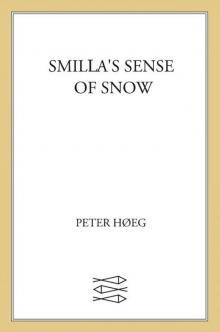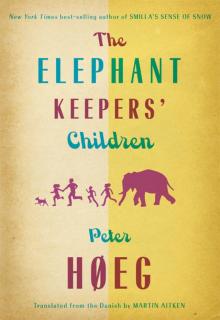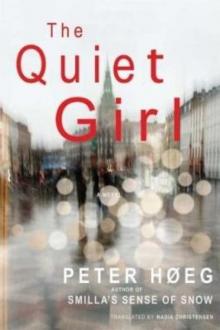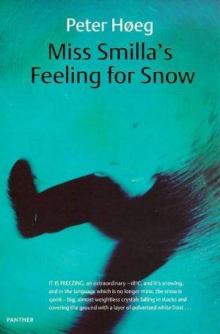- Home
- Peter Høeg
Smilla's Sense of Snow Page 19
Smilla's Sense of Snow Read online
Page 19
He regards his cigar thoughtfully. “You can’t be in my business without running into torture now and then. It’s a complicated subject. A hell of a subject. The legal definition, by the way, says that it has to be carried out by an organization. The important thing for the torturer is to find the victim’s weak point. And this man was blind. That’s not something I discovered. I didn’t know that until we got his medical records. But they knew it. So they concentrated on his hearing. Damned inventive, you have to give them that. It’s psychopathic. But it has a creative streak. What you can’t help wondering is what they were after.”
I think about the curator’s voice on the telephone, about what I had thought was a muffled laugh. They had already broken him by then.
“He had cotton in his ears.”
“Glad to hear it. It was gone when he was fished out. But I guessed about the cotton. When I found the little burns. At some point they reached the end of the line with him. Whenever that might have been. And so they did something quite clever. They moistened some cotton, maybe with lye, since it was handy. They then split an electrical cord and put one pole in each ear. And plugged it in. And then calmly turned on the switch. Dead on the spot. Quick, cheap, clean.”
He shakes his head. He’s a doctor, not a psychologist. He finds the world in which we live beyond comprehension.
“A couple of fucking professionals. But if I believed in New Year’s resolutions, mine would be to make them pay.”
I wake up around 1:00 a.m. One second I’m sleeping, the next I’m awake.
He’s lying next to me. On his stomach with his hands down at his side. Asleep, one side of his face is pressed flat against the sheet. His mouth and nose vibrate gently, as if he were sniffing at a flower. Or were about to kiss a child.
I lie quietly and look at him in a way I haven’t been able to before. His hair is brown, with a few gray streaks. It’s thick, like the bristles of a broom. Burying your fingers in it is like grabbing a horse’s mane.
There in bed, happiness comes over me. Not like something that belongs to me, but like a wheel of fire rolling through the room and the world.
For a moment I think I’ll manage to let it pass and be able to lie there, aware of what I have, and not wish for anything more.
The next moment I want to hang on. I want it to continue. He has to lie beside me tomorrow, too. This is my chance. My only, my last chance.
I swing my legs onto the floor. Now I’m panic-stricken.
This is what I’ve been working to avoid for thirty-seven years. I’ve systematically practiced the only thing in the world that is worth learning. How to renounce. I’ve stopped hoping for anything. When experienced humility becomes an Olympic discipline, I’ll be on the national team.
I’ve never had any patience for other people’s unhappy love affairs. I hate their weakness. I watch them find a man at the end of the rainbow. I watch them have children and buy a Silver Cross royal blue baby buggy and walk along the embankment in the spring sunshine and laugh condescendingly at me and think, Poor Smilla, she doesn’t know what she’s missing, she doesn’t know what life is like for those of us who have babies and a marriage certificate.
Four months later there’s a reunion for their old prenatal care group, and her dear Ferdinand has a little relapse and lines up a few hits on a mirror, and she finds him in the bathroom where he’s rolling around with one of the other happy mothers, and in a nanosecond she’s reduced from the great, proud, sovereign, invulnerable mama to a spiritual gnome. At one stroke she falls to my level and below, and becomes an insect, a worm, a centipede.
And then they take me out and dust me off. Then I’m supposed to listen to how hard it is to be a single mother after the divorce, how they had a fight over splitting up the stereo, how her youth is being sucked out by the child, who is now a machine that uses her and gives nothing in return.
I’ve never wanted to listen to that. “What the hell do you want?” I’ve said to them. “Do you think I edit some kind of lovelorn column? Do you think I’m your diary? An answering machine?”
There’s one thing that is forbidden on journeys by sled, and that is whimpering. Whining is a virus, a lethal, infectious, epidemic disease. I refuse to listen to it. I refuse to be saddled with these orgies of emotional pettiness.
That’s why I’m scared now. Standing there on his floor, next to his bed, I can hear something. It’s coming from inside me, and it’s a whimper. It’s the fear that what has been given to me won’t last. It’s the sound of all the unhappy love stories I’ve never wanted to listen to. Now it sounds as if they’re all contained within me.
But I can still be saved. I can gather up my clothes and put them under my arm. I don’t even have to take time to get dressed. I can just walk out and run up the stairs. In my apartment I’ll pack the essentials, or not even that much. I’ll call a moving company and arrange to have my furnishings moved out and put in storage, and then I’ll put my money box in one pocket and Isaiah’s tape in the other, and I’ll move into a hotel, so that I’m gone when he wakes up and I’ll never have to look him in the eye again.
He opens his eyes and looks at me. He lies there quite still, trying to figure out where he is. Then he smiles at me.
I remember that I’m naked. I turn my back to him and walk sideways over to my clothes. He folded them for me; they haven’t been folded that way since I bought them. I put on my underwear. Modesty is part of the fundamental nature of human beings. It makes me sick to think of the European idea that they can solve all their own self-induced sexual neuroses by laying the meat on the table and putting it under a microscope.
I go into the living room. I have no idea what to do with myself.
He comes in a moment later. He’s wearing boxer shorts. They’re white and reach down to his knees and they’re big enough to be made out of a comforter cover. He looks like a half-naked cricket player.
I notice them now, and remember that I saw them yesterday, too. He has narrow black lines around his wrists and ankles. They are scars. I don’t want to ask him about it.
He comes over to me and kisses me. Even though we at no time have been drunk, you might say that this is our first sober embrace.
Not until now do I remember yesterday. So clearly it’s as though the glow of the fire were on the walls of the apartment, right now.
We set the table together. He has a juicer. He squeezes apple and pear juice into tall glasses. The apple juice is green with a reddish sheen, the pear juice is yellowish. For the first few minutes. Then they start changing taste and color.
We eat virtually nothing. We drink a little juice and stare at the china and the butter and cheese and the toast and the marmalade and raisins and sugar.
There’s no traffic in the harbor, and very little on the bridge. It’s a holiday.
He’s several yards away, but he feels as close as if our bodies were still wrapped around each other.
By the time I kiss him goodbye and go up to my apartment, still in my underwear with my clothes under my arm, we haven’t exchanged a single word that morning.
Back at my place, I decide not to shower. There are so many reasons for not washing. In Qaanaaq, one mother didn’t wash her child’s left cheek for three years because Queen Ingrid had kissed it.
I get dressed and go down to the phone booth on the square. I call University Hospital, Institute of Forensic Medicine, Autopsy Center of Copenhagen, and ask to speak with Dr. Lagermann.
He has aired out the room. In order to get enough oxygen so his next cigar will burn. But for a brief moment there is fresh, cool air.
“Can they stand all this fresh air—the cactuses?”
With Lagermann, irony won’t really get you any return on your investments.
“In the Sahara, in the hollows of Niger, it gets down to 20°F at night. In the daytime it’s 122°F in the sun. That’s the biggest temperature difference within a twenty-four-hour period on the earth’s surface. Sometimes it does
n’t rain for five years in a row.”
“But does anyone breathe at them through a cigar?”
He sighs. “In there I can’t smoke because of my family. Out here I’m harassed by my guests.”
He puts the cigar back in the box. A flat wooden box with a picture of Romeo kissing Giulietta on the balcony.
“Now,” he says, “I want an explanation, damn it.”
I have to collect my thoughts. But they’re stuck on the kiss on the cigar box.
“Do you know Euclid’s Elements?” I ask.
Then I tell him everything in detail. About Isaiah’s death. About the police. About the Cryolite Corporation of Denmark. About the Arctic Museum. About Andreas Licht. A little about the mechanic.
As soon as I start, he forgets and fishes a cigar out of the box.
It takes two cigars for me to finish.
When I stop talking he moves away, as if to put some distance between us. Slowly he strolls along the short narrow paths among the plants. He has a habit of smoking the cigar down to the last fraction of an inch, until he’s standing there with a glowing ember between his fingers. Then he drops the last flecks of tobacco into the plant beds.
He comes toward me.
“I’ve broken my vow of confidentiality. I’m committing a criminal offense if I don’t tell the police what you’ve told me. I’m up against one of Denmark’s most influential scientists, the district attorney, the police commissioner. People have been fired for even thinking half of what I’ve actually done. And I have a family to feed.”
“And the cactuses need watering,” I say.
“But what pride would children have in a father who lets his ass get kicked the first time his job is threatened?”
I say nothing.
“Assistant chief pathologist can’t be the only decent way to make a living. My grandmother was Jewish. Maybe I can take care of the toilets at the Mosaic Cemetery.”
He’s thinking out loud. But he has already made up his mind.
In the kitchen he stops short.
“Year and date of the two expeditions?”
I give them to him.
“It might be informative to look at the forensic medical reports,” he says.
The first pastries have come out of the oven. One is shaped like a naked woman. They used raisins for the nipples and pubic hair.
“Look,” a little boy says to me, “it’s supposed to be you.”
“Yes,” says another one. “Take off your clothes so we can see if it looks like you.”
“Shut up,” says Lagermann.
He helps me with my coat. “My wife thinks that no circumstances warrant giving your kids a couple of swats.”
“In Greenland,” I say, “they don’t hit children, either.”
He looks disappointed. “But it must be damned human to feel tempted.”
The mechanic is waiting on the sidewalk. The two men shake hands. In an attempt to reach each other, the forensics expert stretches up in the air while the mechanic hunches down toward the ground. They meet in the middle, with the awkwardness of a silent movie. As so often before, the question blows in the wind about why men are so rarely cohesive. Why is it that they can be virtual equilibrists at an autopsy table, in a kitchen, behind a dogsled, but as soon as they have to shake hands with a stranger, they sink into infantile helplessness?
“Loyen,” says Lagermann.
He turns away from the mechanic, as if to keep him out of the conversation. A last, failed attempt to preserve his professional discretion and protect a colleague.
“He went in early that morning. He comes and goes as he pleases. But the security guard saw him. I looked it up in the work schedule. He had no other reason to be there. He took that biopsy. He just couldn’t fucking resist. The guard says that the cleaning staff was there at the same time. Maybe that’s why he was so sloppy.”
“How did he know the boy was dead?”
He shrugs his shoulders.
“Ving,” says the mechanic.
Lagermann gives him a hostile look.
“V-ving. Juliane called him. And he must have called Loyen.”
He has the little Morris parked outside. We sit next to each other without saying a word. When he speaks, he stutters badly.
“I f-followed you out here. Stopped near T-tuborg Road and saw you go through the m-marsh.”
I don’t have to ask why. In some ways we are equally frightened.
I open our clothes, straddle him, and put him inside me. We sit like that for a long time.
He puts tape on my front door. He has that kind of opaque white tape that graphic artists use. With scissors he cuts two thin strips and places them over the upper and lower hinges. They’re invisible. If you know where they are, you can just make them out.
“Just for now. Every time you go inside, make sure they’re there. If they’ve come unstuck, you wait for me to arrive. But it’s best to spend as little time here as possible.”
He avoids looking at me.
“If you want to, you c-could stay with me for the time being.”
It’s never clear what that “for the time being” means.
At the university they had a lot of funny ethnological clichés. One of them was about how much European mathematics was indebted to ancient folk culture; just look at the pyramids, whose geometry commands respect and admiration.
This, of course, is idiocy disguised as a pat on the back. Technological culture is superior in the very reality it defines. The seven to eight rules of thumb of the Egyptian surveyors is abacus mathematics compared to integral calculus.
In The Last Kings of Thule, Jean Malauri writes that a significant argument for studying the interesting Polar Eskimos is that you can thus learn something about human progression from the Neanderthal stage to the people of the Stone Age.
It’s written with a certain amount of affection. But it’s a study in unconscious prejudices.
Any race of people that allows itself to be graded on a scale designed by European science will appear to be a culture of higher primates.
Any grading system is meaningless. Every attempt to compare cultures with the intention of determining which is the most developed will never be anything other than one more bullshit projection of Western culture’s hatred of its own shadows.
There is one way to understand another culture. Living it. Move into it, ask to be tolerated as a guest, learn the language. At some point understanding may come. It will always be wordless. The moment you grasp what is foreign, you will lose the urge to explain it. To explain a phenomenon is to distance yourself from it. When I start talking about Qaanaaq, to myself or to others, I again start to lose what has never been truly mine.
Like now, on his sofa, when I feel like telling him why I feel a connection to the Inuits. That it’s because of their ability to know, without a shadow of a doubt, that life is meaningful. Because of the way, in their consciousness, they can live with the tension between irreconcilable contradictions, without sinking into despair and without looking for a simplified solution. Because of their short, short path to ecstasy. Because they can meet a fellow human being and see him for what he is, without judging, their clarity not weakened by prejudice.
I feel the need to tell him all this. Now I let this need grow. I feel it pressing on my heart, my throat, behind my forehead. I know it’s because at this moment I am happy. Nothing corrupts like happiness. It makes us think that since we share this moment, we can also share the past. Since he’s strong enough to meet me in the present, he must be able to contain my childhood as well.
Then I release the impulse. It’s a feeling of tension. Now it rises up and disappears through the ceiling, and he will never have any idea that it existed.
He’s cooking bananas. He leaves them in the oven until the peel is black. In the meantime, he roasts hazelnuts. In the toaster oven. He assures me that it produces a more even roasting.
I feel no urge whatsoever to laugh. He’s as solemn
as a priest. He makes a single cut in the bananas. They are yellow and viscous. He puts heather honey and a few drops of liqueur into the cut.
As far as I’m concerned, the world could stop right now. No one needs to say anything more.
He dabs his lips with the napkin. Sensual lips and a wide mouth. A rather thick upper lip.
“They go up there in 1966. And then they’re quiet for twenty-five years. They go up there again. Then they’re quiet for two and a half years. Then the Baron dies. The police are very interested. The museum burns.”
We each want the other person to say it.
“Seems like something’s up, Smilla.”
“You’re right.”
“They’re getting ready to go back up there. Winter would be the right time to make preparations. So they c-could sail in early spring.”
That’s what I’ve been thinking, too.
“But how are they d-doing it? They can’t organize the trip and the ship and the equipment through the Cryolite Corporation. Because it’s practically shut down.”
I feel like looking at the stars, so I turn off the light. The glow from outside is slightly different here than in my apartment.
“Loyen, Licht, Ving,” I say. “They discovered it. Whatever it is. They found out it was there. Maybe in Hamburg. They were in charge of the first expeditions. But they’re old now. They couldn’t do it again. And someone has killed Licht. Behind the three of them is something else, something bigger, something more ruthless.”
He comes over and puts his arm around me. I can lean my head against his armpit.
“They need a ship,” he says thoughtfully. “I have a friend who knows something about ships.”
I feel like asking him questions, to find out a small part of all that I don’t know about him. But I stop myself.
“I was at the Trade Commission. Geoinform has three people on its board.”
I mention the three names. He shakes his head. Outside the window the Pleiades are barely visible. I point to them.

 The Woman and the Ape
The Woman and the Ape Smilla's Sense of Snow
Smilla's Sense of Snow Borderliners
Borderliners The Susan Effect
The Susan Effect The History of Danish Dreams
The History of Danish Dreams The Elephant Keepers' Children
The Elephant Keepers' Children The Quiet Girl - Peter Hoeg
The Quiet Girl - Peter Hoeg Smilla's Sense of Snow aka Miss Smilla's Feeling for Snow
Smilla's Sense of Snow aka Miss Smilla's Feeling for Snow